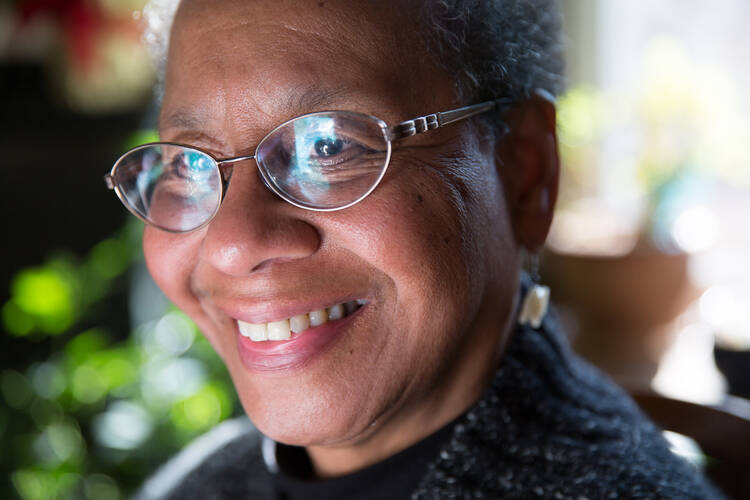Sister Barbara Moore wanted to see the film "Selma," but by herself "because emotionally I knew it would probably be impactful."
So the Sister of St. Joseph of Carondelet sat alone in a St. Louis theater in January and watched the movie about the events of 50 years ago this March 7—the voting rights marches and protests led by the Rev. Martin Luther King Jr. in Selma, Alabama.
Sister Barbara experienced Selma firsthand a half century ago. A native St. Louisan and sister for nine years, she traveled with a delegation of women religious, priests and ministers from Kansas City—it was her first plane ride—and spent three days in Selma March 12-14, 1965.
They were answering Rev. King's call for support from clergy and other religious leaders throughout the country. Men in collars and women in habits were depicted in the film, a powerful witness to the nonviolent approach.
Sister Barbara was there after a delegation from the Archdiocese of St. Louis, which included Sister Antona Ebo, a Franciscan Sister of Mary, and after two men were killed—Deacon Jimmie Lee Jackson (Feb. 26, 1965) and the Rev. James Reeb, a Unitarian Universalist minister who had come from Boston and participated in the same March 9 march as Sister Ebo.
The movie hits the viewer in its earliest moments, first with Annie Lee Cooper (Oprah Winfrey) being denied the chance to register to vote, then with the bombing of a church in Birmingham, Alabama, in which four young girls were killed.
"It was a very powerful opening," Sister Barbara said, adding that the movie "was very painful in many ways to watch ... but I'm glad that I did see it. I found it very much, in many ways, inspirational."
Particularly Rev. King's speeches, which she called "so powerful and relevant to what we're experiencing today."
That would be Ferguson, and the shooting death of Michael Brown by police officer Darren Wilson in August. Brown was black, and Wilson white, prompting racial protests and also violence. One business was torched the day after Brown's death, and 21 more went up in flames in November after a St. Louis County grand jury decided not to indict Wilson.
The violence of riots in Ferguson stands in stark contrast to the peaceful protests in Selma, where Alabama state troopers authorities in riot gear and on horseback initiated the violence by attacking marchers heading to Montgomery, the state capital, on the Edmund Pettus Bridge out of Selma on what became known as "Bloody Sunday."
"For me, the discipline of the movement and nonviolence was so powerful," Sister Barbara said, adding that in the present day, "I think we need to be more disciplined and restrained because (violence) mars the message. To many people, that is all they think about. It's only a few people (being violent), but they make it more difficult for what we want to achieve, which is justice and peace and civil rights."
As St. Louis Archbishop Robert J. Carlson has said, the laws in the United States long ago granted civil rights, including the Civil Rights Act and the Voting Right Act that resulted from Selma. Still, he has called racism systemic and subtle, within people's hearts as opposed to being overt, and Sister Barbara agreed with this sentiment.
"The Civil Rights Act passed in 1964, but there's still segregation—look at our public schools," Sister Barbara said, noting that even with the Voting Rights Act, districts are redrawn to separate areas "predominantly black or Hispanic."
In anniversary celebrations in Selma over the years, Sister Barbara has met many people depicted in the movie—the late Coretta Scott King, Andrew Young, Amelia Boykins and John Lewis, now a congressman from Georgia, whom she describes as a "living saint because he has no bitterness, but he's still on target for what we need to do for justice in our country."
This year in Alabama, anniversary events include a special Mass March 8 at Queen of Peace Parish in Selma, with Archbishop Thomas J. Rodi of Mobile as the main celebrant and area clergy concelebrating.
On March 24, the archbishop, along with several of the nation's African-American Catholic bishops and area clergy, will concelebrate a commemorative Mass at St. Jude Catholic Church in Montgomery. Afterward, there will be the opening and blessing of an interpretive center that will detail the role the Catholic Church played in the struggle for African-American voting rights.
A re-enactment of the last stage of the marches from Selma to Montgomery will take place March 25, starting from the City of St. Jude, which is a Catholic nonprofit organization called and ending at the Alabama Capitol. When segregation was the norm in the Southeast, a Catholic priest started the City of St. Jude to help all in need. During the marches in 1965, Rev. King and 2,000 participants found shelter there.
In her interview with the St. Louis Review, the archdiocesan newspaper, Sister Barbara said that today the events in Ferguson and elsewhere show that much more needs to be done in race relations in this country.
"It's not a time of silence," she said. "It's time to speak up and step up."








